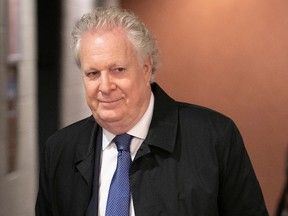In 2020, the former Quebec premier filed a lawsuit seeking $1 million in punitive damages. It has since been increased to $2 million.

A Quebec Superior Court judge heard closing arguments Wednesday in former premier Jean Charest’s lawsuit against the province’s attorney general. Charest is seeking $2 million over how information from a UPAC investigation was leaked to the media.
Michel Déom, a lawyer representing the attorney general, argued before Justice Gregory Moore in the civil trial at the Montreal courthouse that began earlier this week. The former Quebec Liberal Party leader has been attending the proceedings in person this week and testified on Monday.
Sign up to receive daily headline news from the Montreal Gazette, a division of Postmedia Network Inc.
Thanks for signing up!
A welcome email is on its way. If you don't see it, please check your junk folder.
The next issue of Montreal Gazette Headline News will soon be in your inbox.
“They are tossing out bits and pieces in an effort to convince you that a standard has been broken,” Déom told the judge. “But I have trouble finding which standard exactly was transgressed and by whom. Among the evidence, there is not a lot that came out toward that end.”
Charest filed the lawsuit in October 2020, originally seeking $1 million for the leaks that came out of the Unité permanente anticorruption (UPAC) investigation that began in 2014 and ultimately produced no criminal charges against anyone targeted. The anticorruption squad probed how the Liberal party conducted its fundraising while Charest was premier. The probe was based on allegations that surfaced during the Charbonneau Commission.
In February, UPAC announced it had closed the investigation. One month later, Charest increased the amount he is seeking in the lawsuit to $2 million. On Tuesday, his lawyer Jacques Jeansonne argued that the attorney general acted in bad faith during the investigation and that it has caused harm to Charest and his family that is still being felt today.
In his statement of claim, Charest notes that the name of the investigation, Operation Mâchurer, uses a term defined as “to slander someone” or “speaking ill of someone in order to sully their reputation.”
Some people who testified during the Charbonneau Commission alleged that Charest’s friend Marc Bibeau offered the heads of construction and engineering firms favourable treatment on bids for government contracts if they donated generously to the party.
Déom argued that much of what was reported on came out of the Charbonneau Commission and that a particular article published by Le Journal de Montréal, which is central to Charest’s lawsuit, did not reveal much about his private life.
The Journal article in question, published in April 2017, contained specific details about what information UPAC investigators sought pertaining to Charest and Bibeau. That included how investigators asked the Canada Border Services Agency for information on how many times the two men crossed the Canadian border and for details on Charest’s passport. The article also mentioned how UPAC tried, in 2016, to obtain warrants to listen in on Charest and Bibeau’s conversations.
On May 4, 2017, Robert Lafrenière, head of UPAC at the time, was called to testify before a committee at the National Assembly and conceded the leaks came from the anticorruption squad. He told the committee that he had ordered an administrative investigation into the leak and said: “I ardently hope to reach a conclusion and that we find the bandit who did this.”
On Wednesday, Déom argued that the people who manage UPAC investigations are Sûreté du Québec officers and that “they are isolated” from government figures like the public security minister and the attorney general when it comes to information gathered in an investigation.
In his statement of claim, Charest notes that the provincial government did not launch an investigation into the leak until more than a year later, on Oct. 25, 2018. The investigation was handed to two people working under Lafrenière at UPAC; Charest argues it should have been handled by the Bureau des enquêtes indépendantes (BEI) or another police force.
The former premier argues UPAC’s actions demonstrated a “flagrant absence of will to correct the situation and to take the necessary measures the law calls for” to protect personal information.
pcherry@postmedia.com


